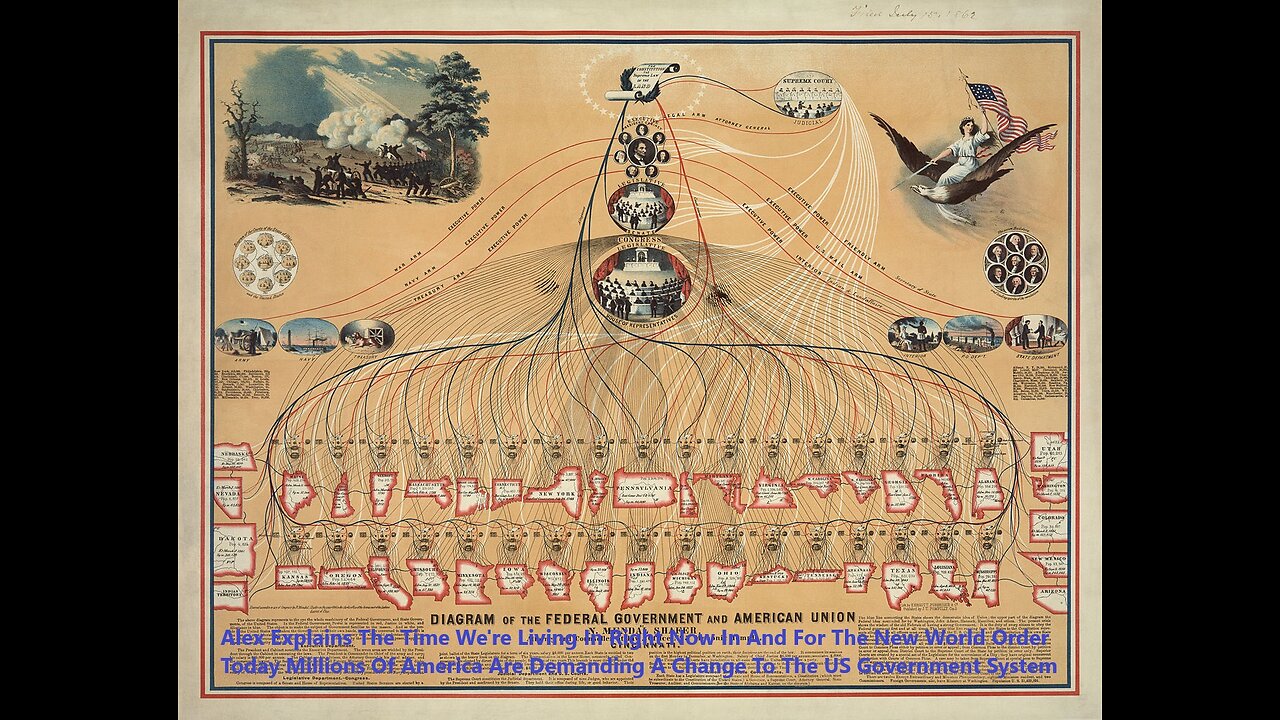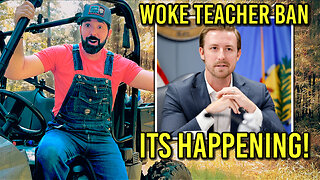Premium Only Content

Alex Explains The Time We're Living In Right Now In And For The New World Order Today
Tens Of Millions Of America Are Demanding A Change To The US Government Death Cult System And Seeking US Government Reform In 2025. A religious or ideological group that requires its cult members to demonstrate their devotion or loyalty through acts of self-harm or sacrifice, often involving mass suicide or murder-suicide. Welcome To Our Channel In 2025 We Are 8 Chinese Women... Who Now Live In U.S.A. Thank You For Watching Our Channel (What If Everything You Were Taught Was A Lie?) Yes We All The People Of The U.S.A. So If You Our Black-White-Yellow-Brown-Red-Woke-Trans-High Yellow-Etc. We At This Channel Do Not Care About Anyone Skin Color At All Now Or In The Past Time. All Info. shared in this channel is for non-hate and non-race and historical purposes to educate, elevate, entertain, enlighten, and empower through old and new film and document allowance is made for fair use for purposes such as criticism, comment, news reporting, scholarship, and research. Fair use is a use permitted by copyright statute that might otherwise be infringing. non-profit, educational or personal use tips the balance in favour of fair use.
Note: We Want You And Other Peoples With A Open Mind To Think Of This Channel 869+ Video's As A Encyclopedia Set. (Not Every Word Or Topics In This Encyclopedia Set Is For Every Person To Read & Some People Will Hate And Other Will Like This Channel Topics... But Remember In The U.S.A. Its Called Freedom Of Speech For Everyone In This World Today). Also In A Dictionary Words And Meanings Change Over Time Too. Note in the original 1611 version of the King James Version of the Bible there was no “J” letter in this Bible for because it did not exist. James was spelled Iames. Jesus was spelled Iesous. One of the most asked questions of the century. How can the Messiah’s Name be Jesus if the letter “J” did not exist 500 years ago ? So if you watch or see old words in are videos... you must look up the words in very old dictionary for the words right meanings for that period of time in our history.
Note: So now the content on this channel may cover lots of controversial topics and explore differing perspectives. It is intended for informational and discussion purposes only. Views expressed by guests or in comments do not necessarily reflect the opinions of the channel owner. We encourage respectful dialogue and open-mindedness. However, viewers are advised to conduct their own research and exercise critical thinking when engaging with the content. This channel does not endorse or condone any form of hate speech, discrimination, or violence. Viewer discretion is advised.
Welcome To The New World Order - The Year Zero - The Real Origin of the World - National Anthem of the United States of America and Confederate States of America National Anthem and New World Order National Anthem Is "The Ostrich" Lyrics by Steppenwolf from the album 'Rest In Peace' 1967-1972 A.C.E. The Conspiracy to Rule Your Mind chronicles how the ruling elite have established global domination and the ability to effect the thoughts, decisions, and world view of human beings across the globe by systematically infiltrating the media, academia, industry, military and political factions under the guise of upholding democracy. Learn how this malevolent consortium has dedicated centuries to realize an oppressive and totalitarian rule through any means necessary, not limited to drug trafficking, money laundering, terror attacks and financial crisis within the world economy.
Worldwide tyranny is already in full effect, the food we eat and the air we breathe are not off limits. Will we be able to stop this madness before we become an electronically monitored, cashless society wherein ever man, woman and child is micro chipped? We live in the world where sex is free and love costs, where losing a phone is scarier than losing morale, where it is fashionable to get drunk and using drugs, because if you don’t do that, you’re old and out, where men cheat on their wives with girls and if they don’t, it’s for fear of being caught, where girls are more afraid of being pregnant than getting AIDS, where pizza delivery is faster than an ambulance, where clothes decide a person’s value and money is more important than friends and family... This is not my world. Where has my true world gone? The New World Order Is Upon Us - Preserve Your Liberty By Being Prepared ! - We The People of the New World Order Thank You.
The Left/Right paradigm isn't only exposed by race and immigration issues. The Left and Right are in lockstep on every issue that really matters: The IRS. Income tax. Federal Reserve system. Endless wars. Endless expansion of tyranny and ever contracting liberty. Chronically wide-open borders. Suicidal immigration policies. Don't you see? The democrats and republicans exist only to provide the illusion of choice. A strong "us versus them" simulation in every election. It's ritualized tribalism. But the joke is, it doesn't matter which team wins, because both sides have the same agenda. God, guns and gays are phony "issues" to bolster the illusion of "difference" between the parties. The only thing that makes all this possible is that people aren't aware of the scam. Just knowing they are either "Team Red" or "Team Blue" liberates them from the responsibility of having to actually know or think anything. Then they feel righteous when their team wins, or despondent when they loose. It's no coincidence that the system works exactly like sports. There comes a point when ignorance and apathy become treason. We are past that point, people.
Everything you want to know what could be more terrifying than being trafficked for sex? Being murdered in a ritual sacrifice. And even worse than that would be being murdered in a ritual sacrifice so wealthy elite cabalists can harvest your adrenal glands to get the compound Adrenochrome they need to prolong their decrepit lives! It's so easy to be overwhelmed and feel beaten by the amount of negative and discouraging information being spread by the mainstream (fake stream) media. There are truly awful people in WEF and WHO, who want to reduce us to the level of serfs or chattel, but we can resist, indeed, we must resist. Be calm, be objective and be positive. Right is Might. “The only thing necessary for the triumph of evil is that good men should do nothing.” Nobody Is Safe From People's Republic Of The Tyrannical We The Sheeple People of The United States of America and A Real True Bill of State Rights Of Government July Forth 1776 The Bill of Rights is the first ten amendments to the United States Constitution, which limit the power of the federal government and guarantee certain freedoms and rights to all colour of people and for the citizens of All America.
Thanks For Calling and Remember the U.S. Government Leave No Witnesses Alive Behind Them. If You See Fraudulent or Criminal Activities by U.S. Government. Please Call Us (ASAP) So We Can Send Someone Out To Kill You! Thanks Again For Calling.
A symbolic example of this secret truth is contained within the National Bird of the United States. Many Americans and people around the world think that our National Bird of the U.S. is an eagle. They are wrong. The symbolic bird you will find on the Great Seal of the United States is actually the mythical bird known as a Phoenix. The scroll in the beak of the Phoenix is the Latin motto of 13 letters, E Pluribus Unum, meaning in English, ” Out of Many, One”. Later an olive branch and a bundle of 13 arrows (representing peace and war, respectively) were included in the claws of the phoenix. Over its head there appears 13 stars that are arranged in rows of 1-4-3-4-1, forming a six-pointed star. The Star of David and symbol of Israel.
Your Birth Certificate Equals Slavery Bondage Understanding How Admiralty Maritime Laws Work And What Is And Why Is U.S.A. Laws Are Under A Gold Fringe Flag? So have you ever walked into a court room and notice a gold fringe flag hanging in the room? Did you ever wonder why every single flag in court rooms and government buildings is a gold fringe flag? And do you remember how many times you pledged your allegiance to that flag?
“I pledge allegiance to the flag, of the United States of America, and to the republic for which it stands, one Nation, under God, indivisible, with Liberty and Justice for all.”
Reciting the pledge was the first things we did in school every day, from day one of first grade, to the last day of eighth grade. So, after eight years of repetition, the neuro-pathways are grooved in deep into our brains. And our loyalty so strong to the red, white and blue. Then, one day, we wake up in our adult world, and guess what? The flag now has gold fringe around it and we NEVER asked why? Why is this flag different than the one we were taught to love and be loyal to? We never questioned it. We just assumed it was the same, dear old stripes and stars, and went about out busy little lives.
So, the flag in the court room is a gold fringe flag. Who cares? That doesn’t affect me, right? You should care and yes, it does affect you. The gold fringe flag is a clear sign of a system being in place that is not the system we are taught to believe is in place. A gold fringe flag was historically used during times of war in maritime admiralty law(which we are in right now as well).
The gold fringe flag is not the same flag that is approved for our Constitutional Republic in USA code Title 4 Ch 1 & Ch 2. The fourth color (yellow) is not approved in the code. Also, you will notice the tassels hanging from the flag. These are also symbolic of admiralty law, which is the law of the sea.
So, wait a minute? Our flags that hang in our government buildings and court rooms are actually representative of war-time in the law of the sea/admiralty law?? Yes. We are in fact, functioning in maritime admiralty law, and our court system is actually upholding a corporation that goes by the name of UNITED STATES. In other words, we are not in a republic, and we are not dealing with the constitutional United States of America. Well, actually, the UNITED STATES does have a constitution but it is not the same as the original Constitution that was drafted for the republic. This is why the gold fringed flag controversy is such a big deal, because it symbolize.
So, now it is up to us to figure out how to navigate our way through the law of the sea, in order to find our remedies. The possibilities for this are endless. But it basically boils down to either mastering the current system and learning how to navigate your way through it, without incurring personal liability for anything. Or, separating yourself completely from the system, and moving yourself back to common law. In other words, you can go as far as expatriating yourself from the UNITED STATES so that you no longer belong to that corporation. Therefore, their rules would no longer apply to you. Cool, huh?
What Is Maritime (aka Admiralty) Law, and Why Is It Important ? What Is Maritime Law?
Maritime law, also known as admiralty law, is a body of laws, conventions, and treaties that govern private maritime business and other nautical matters, such as shipping or offenses occurring on open water. International rules governing the use of the oceans and seas are known as the Law of the Sea.
The Presidential Hotline Pedophile and Secret Human Trafficking and Child Sex Ring Etc. Call 1-866-4-5455-968 ( 1-866-I-Kill-You ) should be used when all your attempts to get assistance from a government department, province, municipality or state agency have failed. It is not only a complaints line. You can call to share your views or provide solutions to the challenges in your community. We also list the help line numbers of non-governmental organization's working with government. You may call at 987-654-3210 ext. new world order!
In 1984 Tried To Warn Us We The People About Every record has been destroyed or falsified, every book rewritten, every picture has been repainted, every statue and street building has been renamed, every date has been altered. And the process is continuing day by day and minute by minute. History has stopped. If you want a picture of the future, imagine a boot stamping on a human face forever. This Information Is For Everyone To See The Real Truth Today. This Channel Is Up For 666 Day Now And Rumble Said We Have Made In Ad Money A Total Of $682 Dollars As Of Nov. 12, 2024 So Our Ave. Money Is $1.02 Cents A Day. Yes This Channel Is Not About Making Money At ALL. Thank You Everyone For Over 5 Million+ Views And For Watching All Of Our 872 Video's In 2022-2023-2024.
We hold that the American People Created a Constitutional Republic for the United States of America and never gave permission for a foreign controlled corporation to govern Us. As a soldier sworn to uphold the laws of the Constitution of the USA, what do you know about these newer movements such as "Sovereign Citizens", people that sign a "Declaration of Sovereign Intent" and/or belong to the "Republic for the United States of America?" Some of these people may honestly believe in what these movements stand for and they enjoy the rights that our Constitution provides, but there are a number of domestic extremists and criminal activities associated with those groups as well. This is an open-ended question so please feel free to comment.
All religion is a tool to have more control over the people's thoughts and behavior. Now religion is basically a pyramid scheme making the few at the top rich. Why does a church need a 15 million dollar compound with multiple buildings? Why does the pastor usually drive a nice new Mercedes or BMW while the flock struggles and still gives the church money every week? Don't people join the church to change their life and help others the same way? It's like politicians, they should almost be volunteer jobs or just low paying. Otherwise you just keep getting people who want more money regardless of how they get it. Take from the poor and keep it doesn't sound like caring for the people. For the most part big churches were corrupted centuries ago with power hungry people. Now it's greed, a larger flock or church means they get more money every week!!
The only way to attack illegal activity is to focus on the illegal activity and its perpetrators, former President Reagan argued in a 1983 speech.
“You won’t get gun control by disarming law-abiding citizens. There’s only one way to get real gun control: Disarm the thugs and the criminals, lock them up, and if you don’t actually throw away the key, at least lose it for a long time,” he said.
all gun laws are unconstitutional therefore illegal and void. no government official anywhere in the united states of America has any legal lawful constitutional authority or jurisdiction to pass or enforce any form of gun laws whatsoever anywhere in the united states of America under the supremacy clause, article 4 section 2 paragraph 1, second amendment shall not be Infringed clause,9th amendment enumeration clause,10th amendment nor prohibited by it to the states clause,14th amendment section 1 no state shall make or enforce any law which shall abridge the privileges or immunities of citizens of the united states clause combined anyone passing or enforcing any form of gun laws anywhere in the united states of America are guilty of felony crimes in violation of Title 18 U.S.C. section §241 conspiracy against rights, Title 18 U.S.C. section §242,if they are working with or on behalf of any anti Gun organizations, association, movement, group they are guilty in violation of Title 5 U.S.C. section §7311 Ex. ORD. No. 10450 subsection (5), they are guilty of Perjury in violating oath of office swearing false oath, insurrection and rebellion against the constitution of the united states of America, and Treason. Yes that's what our second amendment exists for to take down terrorist tyrant traitors calling themselves government.
"You won't get gun control by disarming law-abiding citizens. There's only one way to get real gun control: Disarm the thugs and the criminals, lock them up, and if you don't actually throw away the key, at least lose it for a long time." - President Reagan
The natural right to keep & bear arms protects all of our other natural rights. Two of the very few reasons government exists is to protect the country and protect the natural rights of its citizens. However, the government, fed and state, have abandoned their purpose and have made themselves the enemy of America and Americans. They not only fail to protect our rights, they steal our wealth to spend Attacking our natural rights and trying to replace them with socialist welfare & subsidies like murdering babies & state-mismanaged death care.
The Second Amendment is not about duck hunting…. It is about our rights, all of our rights to be able to protect ourselves from ‘All Enemies Foreign and Domestic’. This includes protections from a possible Tyrannical Government.”
We at this channel would like to add this quote for everyone to open your own mind this year: Your body diet is not only what you eat. It is also what you watch, what you listen to, what you read, the people you hang out with and the things you subject your mind, body and soul too. Always be mindful of the things you put into your body emotionally, spiritually and physically. Thank You Everyone Who Watch Our Video's To Help Other In 2025.
Americans’ Views of Government: Decades of Distrust, Enduring Support for Its Role 68% say most political candidates run for office ‘to serve their own personal interests’ Americans remain deeply distrustful of and dissatisfied with their government. Just 20% say they trust the government in Washington to do the right thing just about always or most of the time – a sentiment that has changed very little since former President George W. Bush’s second term in office.
The public’s criticisms of the federal government are many and varied. Some are familiar: Just 6% say the phrase “careful with taxpayer money” describes the federal government extremely or very well; another 21% say this describes the government somewhat well. A comparably small share (only 8%) describes the government as being responsive to the needs of ordinary Americans.
The federal government gets mixed ratings for its handling of specific issues. Evaluations are highly positive in some respects, including for responding to natural disasters (70% say the government does a good job of this) and keeping the country safe from terrorism (68%). However, only about a quarter of Americans say the government has done a good job managing the immigration system and helping people get out of poverty (24% each). And the share giving the government a positive rating for strengthening the economy has declined 17 percentage points since 2020, from 54% to 37%.
Yet Americans’ unhappiness with government has long coexisted with their continued support for government having a substantial role in many realms. And when asked how much the federal government does to address the concerns of various groups in the United States, there is a widespread belief that it does too little on issues affecting many of the groups asked about, including middle-income people (69%), those with lower incomes (66%) and retired people (65%).
Among 11 groups included in the survey, the only group about which a majority of adults (61%) say the government does too much for are high-income people.
Republicans and Democrats generally agree that the government does too little regarding issues of concern for several groups, including retirees, rural residents, suburbanites and middle-income people. And nearly identical shares of both Republicans and independents who lean toward the Republican Party (52%) and Democrats and Democratic leaners (56%) say it does too little on issues affecting “people like you.”
However, Democrats are more likely than Republicans to say the government does too little on issues impacting children (63% of Democrats vs. 44% of Republicans) and parents (49% vs. 41%). And while 43% of Democrats say the federal government does too little on issues affecting people in cities, just 27% of Republicans say the same. Democrats (79%) also are considerably more likely than Republicans (50%) to say the government does too little to address issues facing lower-income people.
The public’s attitudes on the overall size and scope of government – and whether the government should have a “major role” in specific issue areas – have changed little in recent years. Clear majorities of Americans (60% or more) say the government should have a major role in 11 of 12 issue domains included in the new survey – including terrorism, immigration and the economy, as well as ensuring access to health care and protecting the environment. The only exception is for helping people out of poverty (52% say it should have a major role).
Republicans are less likely than Democrats to favor a major role for government in most areas; this is especially – and increasingly – the case for alleviating poverty. Still, majorities of Republicans favor a major role for government in eight of the 12 areas. Majorities of Democrats say the government should have a major role in all 12.
These are among the findings from a new Pew Research Center survey conducted April 25-May 1, 2022, among 5,074 U.S. adults on the Center’s nationally representative Americans Trends Panel. The study builds upon the Center’s previous reports about the government’s role and performance, most recently published in 2020 and 2017.
As in the past, state and local governments are viewed more favorably than the federal government. Yet amid controversies over state policies on issues ranging from abortion to the textbooks used in public schools, the relationship between the federal government and state governments has raised a number of differing concerns among the public. (Note: This survey was conducted before the leak of a draft opinion from the Supreme Court indicating that the court is likely to overturn the Roe v. Wade decision, which guarantees access to abortion. For more on public attitudes toward abortion, see “America’s Abortion Quandary”).
About a third of Americans (34%) are extremely or very concerned that the federal government is doing too much on issues better left to state governments; another 35% are somewhat concerned about this. An identical share expresses an entirely different concern – that state governments are not willing enough to work with the federal government (34% say they are extremely or very concerned about this).
Republicans (54%) are far more likely than Democrats (18%) to say they are extremely or very concerned that the federal government is doing too much on issues better left to the states. Democrats are more likely to say they are extremely or very concerned about states being uncooperative with the federal government (48% vs. 18%).
Moreover, about half of Democrats (53%) say they are extremely or very concerned that an individual’s rights and protections may vary depending on the state in which they live. By contrast, a smaller share of Republicans (33%) have a similar level of concern that a person’s rights may vary by state.
Other important findings
Low trust in government among members of both parties. As in the past, trust in government is higher among the party of the president than among the “out” party; still, only 29% of Democrats and just 9% of Republicans say they trust the government just about always or most of the time. The share of Republicans expressing trust in the federal government is currently as low as it has been at any point in the last 60 years; levels of trust among Democrats reached historic lows during George W. Bush’s and Donald Trump’s presidencies. (For more, see this interactive on public trust in government, 1958-2022.)
In their own words – how people feel about government performance. When asked to name, in their own words, areas where the federal government is doing a bad job, people cite a number of issues, including taxes and spending, immigration (with some specifically citing the situation at the U.S.-Mexico border) and social welfare programs. When asked about where the government is doing a good job, people also cite multiple issues; national security and foreign policy are mentioned most often.
Most say laws are needed to protect people from themselves. Republicans and Democrats have fundamental differences of opinion about the government’s role in protecting Americans. Among the public overall, 59% say that sometimes laws are needed to protect people from themselves; 39% say it is not the government’s job to protect people from themselves. A 61% majority of Republicans say it’s not the government’s job to protect people from themselves; an even larger majority of Democrats (77%) say laws are sometime needed for that purpose.
Declining confidence in career government employees. A larger share of adults say they have a great deal or fair amount of confidence in career employees at federal agencies (52%) than in officials appointed by the president to oversee agencies (39%). However, the share expressing confidence in career employees has declined 9 points since 2018; there has been less change in confidence in political appointees.
Political candidates seen as motivated by their own interests, less by serving their communities. As the 2022 political campaigns heat up, 65% of adults – including nearly identical shares in both parties – say that all (15%) or most people (50%) who seek office at the local, state or federal level do so to serve their own personal interests. By contrast, just 21% say all or most people who run for office do so in order to serve their communities.
Most Americans have at least some confidence in nation’s future. Only about a quarter of adults (24%) say they are satisfied with the current state of the nation, and the public views a number of problems – especially inflation – as serious. Yet a majority of Americans continue to say they have a lot (17%) or some (51%) confidence in the future of the United States. These views have changed little since 2021.
1. Public trust in government
Today, two-in-ten Americans say they trust the government in Washington to do what is right just about always (2%) or most of the time (19%).
Trust in government has remained at roughly this low level for more than a decade. Since the 2007-2008 financial crisis, no more than about a quarter of Americans have expressed trust in the federal government to do what is right all or most of the time.
Among Democrats and independents who lean toward the Democratic Party, 29% now say they trust the federal government just about always or most of the time, down slightly since 2021. Only about one-in-ten Republicans and GOP leaners say they trust the government in Washington to do what is right just about always or most of the time, also unchanged since the beginning of the Biden administration.
By comparison, Republicans were more trusting of the federal government than Democrats during Donald Trump’s presidency. Overall, partisans have tended to express higher levels of trust in government when a president of their party holds the White House. GOP levels of trust in government today are near an all-time low.
As has been the case for more than a decade, a majority of Americans say they feel frustrated with the federal government: 60% say this today, while 22% say they are basically content and 18% say they are angry.
Overall anger at government is little changed over the last year, and slightly lower than it was throughout the Trump administration. About two-in-ten have expressed contentment with the federal government for much of the last eight years (though contentment was somewhat higher in April 2021, when 29% of U.S. adults said they were basically content with the federal government).
Among Democrats, the share who say they are basically content with the federal government has decreased by 14 percentage points in the past year, from 43% to 29%, putting it roughly on par with Democratic views about the federal government throughout Barack Obama’s administration. The share of Democrats saying they are frustrated has increased since last year from 52% to 64%; just 6% now say they are angry with the federal government, up slightly from last year when 4% said this. But Democratic anger with the federal government remains substantially lower than it was during Donald Trump’s presidency and is slightly lower than it was throughout Obama’s administration.
About a third of Republicans (32%) report being angry at the federal government, identical to the share who said this a year ago. The shares who say they are basically content (10%) or frustrated (57%) are also similar to what they were a year ago (13% content, 55% frustrated).
Age differences in distrust of the federal government
Nearly identical shares of adults across age groups say they trust the federal government to do what is right only some of the time or never, with 80% of adults under age 50 and 78% of adults ages 50 and older saying this. Older and younger Democrats, however, express different levels of trust in the government in Washington to do what is right.
Among Democrats ages 65 and older, 57% say they trust the government to do what is right only some of the time or never. By comparison, about seven-in-ten Democrats ages 35 to 49 (72%) and ages 50 to 64 (69%) say the same, as do 78% of Democrats ages 18 to 34.
In contrast, there are no substantial age differences in trust in government among Republicans. Still, despite these sizable differences among Democrats, Democrats of all ages are more trusting of government than Republicans: About nine-in-ten Republicans in each of these four age groups say they trust the government in Washington to do what is right only some of the time or never.
2. Public views about the federal government Asked about some descriptions of the federal government, relatively small shares of Americans say they think of the federal government as responsive to the needs of ordinary Americans, being careful with taxpayer money, or being able to address new problems as they come up. No more than one-in-ten say each of these phrases describe the federal government very or extremely well, and less than half say they describe the federal government even “somewhat” well. Majorities say these are not too, or not at all, good descriptors of the federal government.
By comparison, about six-in-ten Americans say the phrase “unfairly benefits some people more than others” describes the federal government extremely well (31%) or very well (29%), and another quarter say it describes the government somewhat well.
The public’s views are more mixed when it comes to whether the government “interferes too much in people’s lives.” A third say that this phrase describes the federal government extremely (15%) or very well (18%); 34% say it describes the government somewhat well, while about three-in-ten say it describes the government not too (24%) or not at all (7%) well.
There are only modest partisan differences in views of whether the federal government unfairly benefits some people more than others. Republicans and independents who lean toward the Republican Party are somewhat more likely than Democrats and Democratic leaners to say this phrase describes the government extremely well (35% vs. 29%), but about six-in-ten in both partisan groups say it describes the federal government very or extremely well. Only about one-in-ten in either party say it is not too or not at all a good descriptor of the federal government.
The partisan divide is much larger on the question of whether government “interferes too much in people’s lives.” A majority of Republicans (55%) say this phrase describes the federal government very or extremely well, compared with 17% of Democrats. And about half of Democrats (53%) say this describes the government at least somewhat well, while 84% of Republicans say the same.
Sizable shares in both parties express doubts about the federal government’s ability to address new problems as they arise, as well as its responsiveness to the needs of ordinary Americans. Though these doubts are more widespread among Republicans than Democrats.
Seven-in-ten Republicans and 41% of Democrats say the phrase “able to address new problems as they come up” describes the federal government not too or not at all well, while just 13% of Democrats and 4% of Republicans say it describes the government very or extremely well. Nearly half of Democrats (45%) and a quarter of Republicans say this describes the federal government somewhat well.
A similar pattern is evident in views of whether the statement “responds to the needs of ordinary Americans” describes the federal government well. Roughly three-quarters of Republicans (76%) and 53% of Democrats say it does not, and only about one-in-ten Democrats (11%) and just 4% of Republicans say it describes the federal government very or extremely well. About a third of Democrats (36%) and 19% of Republicans say this describes the government somewhat well.
Fewer than half in either party express much confidence in the way the federal government spends money, though Republicans are particularly likely to be critical of the federal government’s handling of taxpayer dollars.
About nine-in-ten Republicans say that the phrase “careful with taxpayer money” does not describe the government well, including 62% who say it describes the government not at all well. Among Democrats, six-in-ten say this phrase describes the federal government not too (38%) or not at all well (22%). While 8% of Republicans and 31% of Democrats say this describes the federal government somewhat well, no more than one-in-ten in either party say that this phrase describes the government extremely or very well (3% of Republicans, 9% of Democrats).
Public views of the challenges government faces
While the public is dissatisfied with some aspects of the federal government’s performance, many Americans also view the job of government as harder than it was in the past. About half of adults (49%) say the statement “the problems facing the federal government are more difficult than they were a few decades ago” describes their views very or extremely well, while just 18% say it does not describe their views; 32% say it describes their views somewhat well.
On balance, more Americans say “people aren’t willing to pay for the things they want the federal government to do” describes their own views extremely or very well (36%) than say it does not (23%). About four-in-ten (39%) say this describes their views somewhat well.
In contrast, just 21% of Americans say the statement “the federal government does a lot of good things it doesn’t get enough credit for” describes their views very or extremely well, while nearly twice as many say this describes their views not too or not at all well (41%). About four-in-ten (37%) say it describes their views somewhat well.
Democrats are somewhat more likely than Republicans to say that the problems facing the federal government are more difficult today than in the past. A majority of Democrats (54%) say the statement “the problems facing the federal government are more difficult than they were a few decades ago” describes their views very or extremely well, compared with 43% of Republicans.
There are no significant partisan differences on the question of whether people are willing to pay for what they want the federal government to do. Similar shares of Republicans (38%) and Democrats (36%) say the statement “people aren’t willing to pay for the things they want the federal government to do” describes their views very well or extremely well.
Partisan differences are larger when it comes to whether the government deserves more credit than it gets. About three-in-ten Democrats (31%) say the statement “the federal government does a lot of good things it doesn’t get enough credit for” describes their views extremely or very well, while an additional 40% say this describes their views somewhat well. By comparison, nearly six-in-ten Republicans (57%) say this statement describes their views not too or not at all well.
Nearly four-in-ten (38%) say that the statement “dealing with federal government agencies is often not worth the trouble” describes their views very or extremely well, and a similar share (39%) say this describes their views somewhat well. Just 22% say this describes their views not too or not at all well.
While large shares in both parties express at least somewhat negative views about dealing with government agencies, Republicans are more likely than Democrats to say that this statement describes their views very or extremely well. Half of Republicans say this, compared with 28% of Democrats; 84% of Republicans and 72% of Democrats say it describes their views at least somewhat well.
There are only modest differences in these views between the 31% of Americans who have contacted a government agency over the last year and the 68% who have not.
Personal freedoms and the federal government
Just over half of Americans (54%) say the federal government does a great deal (11%) or a fair amount (44%) to protect people’s personal freedoms, while 35% say the government protects people’s freedoms “not too much” and one-in-ten say the federal government does not at all protect people’s personal freedoms.
Overall, the public holds similar views on whether the federal government restricts people’s personal freedoms: 54% say the government restricts people’s freedoms a great deal (20%) or a fair amount (34%), while 40% say the government does not do much to restrict people’s freedoms and just 6% say the federal government does not at all restrict people’s freedom.
Democrats are more likely than Republicans to say the federal government works to protects people’s personal freedoms. About seven-in-ten Democrats (69%) say the federal government does at least a fair amount to protect people’s freedoms. By contrast, 39% of Republicans say this.
Among Republicans, about half of moderate and liberal Republicans (48%) say the federal government does at least a fair amount to protect rights and freedoms. Conservative Republicans (34%) are considerably less likely to say this. There are no ideological differences among Democrats on how much the federal government does to protects people’s rights.
Republicans are much more likely to see the federal government as restricting people’s freedoms: Nearly three-quarters say the government does at least a fair amount to restrict people’s personal freedoms, including 32% who say it does a great deal to restrict people’s freedoms. Still, conservative Republicans (77%) are more likely than moderate and liberal Republicans (66%) to hold this view.
Most Democrats do not see the federal government as restricting people’s freedoms: 62% say the federal government does not do much or anything at all to restrict people’s personal freedoms, while 38% of Democrats say the government does at least a fair amount to restrict these freedoms. Conservative and moderate Democrats are more likely than liberal Democrats to say the federal government restricts personal freedoms (45% vs. 29%).
Beyond ideological divisions, there are only modest demographic differences among Republicans in views of how the government affects people’s rights and freedoms. Across most demographic groups, about seven-in-ten Republicans say the government does at least a fair amount to restrict personal freedoms, while about four-in-ten say the government protects people’s freedoms. However, there is more variation in these views among Democrats.
While 57% of Black Democrats, for example, say the federal government does at least a fair amount to protect personal freedoms, only a slightly smaller share (51%) say the federal government does a lot to restrict freedoms. By comparison, White Democrats are more than twice as likely to say the federal government does a fair amount to protect people’s freedoms (73%) than to say it does a fair amount to restrict people’s personal freedoms (30%). And while 65% of Hispanic Democrats say the government protects people’s freedoms, 48% say the government restricts personal freedom.
Democrats with a college degree or more education are far more likely to say the federal government protects people’s personal freedoms than to say it restricts them (78% vs. 24%). Among Democrats who have less formal education, there is a much narrower gap in the shares holding these two views (63% vs. 46%).
There are also wide differences in perceptions of the federal government supporting or hindering personal freedoms by household income among Democrats. Those with lower household incomes are just slightly more likely to say the government does a fair amount to protect personal freedoms (59%) than to say it does a fair amount to restrict freedoms (50%). Middle-income Democrats are twice as likely to say the government protects personal freedoms (72%) than to say it restricts personal freedoms (36%). Among upper-income Democrats, fully 82% say the government protects personal freedoms, while just 16% say the government restricts personal freedoms.
Large shares in both parties say the government intentionally withholds information
About seven-in-ten Americans (71%) say that the federal government intentionally withholds important information from the public that it could safely release, while 28% say the federal government publicly releases the important information it can safely release.
Among the overall public, these views are little changed from 2018. But over this time period, Republicans have become more likely to say that the government intentionally withholds information, while Democrats have become less likely to say this. Today, more than eight-in-ten Republicans (84%) say that the government intentionally withholds information, up from 66% who said this in December 2018. And 60% of Democrats now say this, down from 73%.
Younger Democrats are more likely than older Democrats to say that the federal government intentionally withholds important information from the public that it could safely release.
Seven-in-ten Democrats ages 18 to 34 say that the government does withhold important information, while 29% say the federal government publicly releases the information it can safely release.
Roughly six-in-ten Democrats ages 35 to 49 (62%) say the government withholds information, as do 55% of Democrats ages 50 to 64. Democrats ages 65 and older are more closely divided: About half (52%) say the government does release the information it can safely release, while a similar share (46%) say the government intentionally withholds important information.
Republicans’ views on whether the federal government intentionally withholds important information that it could safely release are nearly identical across age groups: At least eight-in-ten say the government withholds information among Republicans ages 18 to 34 (81%), 35 to 49 (84%), 50 to 64 (85%) and 65 and older (85%).
3. Federal government: Performance and role
Americans’ evaluations of the federal government’s performance in specific realms have shifted somewhat since 2020. For the most part, these shifts reflect changes in the political landscape: Democrats tend to rate the government’s performance more positively now than when Donald Trump was president, while Republicans have adopted more negative views – a similar, inverse shift in evaluations was seen between 2015 (during Barack Obama’s presidency) and the fall of 2017 (several months into Trump’s term). Still, as in the past, the public makes distinctions in its evaluations of the federal government’s performance in different realms – giving high marks in some areas and very low marks in others.
The public’s views of the appropriate role for government have, for the most part, changed only modestly over time. While most Americans say the government should have a major role on such issues as terrorism and immigration, there is less agreement about other areas – notably, in alleviating poverty.
High marks for government’s handling of disasters, terrorism, safety of food and medicine
Seven-in-ten Americans say that the federal government is doing a very or somewhat good job in responding to natural disasters. Similar shares say that the government is doing a good job at keeping the country safe from terrorism (68%), ensuring that food and medicine are safe (67%) and setting fair standards for workplaces (64%).
About half of Americans give positive assessments of the government’s performance protecting U.S. interests around the world and effectively handling threats to public health.
The public is more critical of the government’s performance in other areas: Just 37% say it is doing at least a somewhat good job of strengthening the economy and only about a quarter give the government positive ratings for managing immigration and helping people get out of poverty (24% each).
As in the past, there are sizable partisan differences in views of government performance. Democrats and Democratic-leaning independents are more likely than Republicans and GOP leaners to give positive assessments on all but two items in the survey – ensuring access to health care and protecting the environment.
One of the widest partisan divides in views of government performance – of 12 items included in the survey – is on strengthening the economy. About half of Democrats (53%) say the federal government is doing a very or somewhat good job strengthening the economy. Only 17% of Republicans say the same.
There are similar gaps between partisans in assessments of protecting U.S. interests around the world, keeping the country safe from terrorism and effectively handling threats to public health.
Democrats are most positive in their assessments of the federal government’s performance keeping the country safe from terrorism: An overwhelming 84% majority say the government is doing a good job at this.
About three-quarters of Democrats also say the government is doing a very or somewhat good job of ensuring that food and medicine are safe and responding to natural disasters (73% each).
While Republicans are more negative in their assessments of government performance than they were in 2020, there are some areas where Republicans say the government is doing a good job. For instance, about two-thirds of Republicans (66%) say the government is doing a good job responding to natural disasters.
Six-in-ten Republicans also offer positive views of government performance on setting fair and safe standards for workplaces and a similar majority (59%) say the same about ensuring that food and medicine are safe.
The only area in which a significantly larger share of Republicans rate the job the federal government is doing more positively than Democrats is on protecting the environment. About half of Republicans (47%) say this, compared with 36% of Democrats. Nearly equal shares in both parties say the government does a good job of ensuring access to health care (46% of Republicans, 45% of Democrats).
Large partisan shifts in views of government performance since 2020
On many issues, Democrats now offer more positive assessments and Republicans offer more negative assessments than in 2020 during the Trump administration. This is a continuation of a pattern in which partisans tend to have more positive views of government when the presidency is held by a member of their party. GOP assessments of government were higher, and Democratic assessments lower, in 2017 and 2020 than both today and in 2015 (during the Obama administration).
In 2020, 70% of Republicans said the government was doing a good job handling threats to public health, while just 17% of Democrats said the same. Today, 62% of Democrats approve of the job the government is doing handling threats to public health, while only about a third of Republicans (34%) say this.
Republicans have become much more critical of the government’s handling of the economy than they were two years ago: In 2020, 80% had positive assessments of the job the government was doing to strengthen the economy, but today, just 17% say the same. Among Democrats, there has been a more modest increase in positive views: Two years ago, 36% said the government was doing a good job strengthening the economy, today about half of Democrats (53%) say this.
In 2020, 87% of Republicans gave the government positive ratings for keeping the country safe from terrorism. Today, about half (51%) say the same. Among Democrats, 84% give the government positive ratings on this issue today, similar to Republicans two years ago.
When it comes to managing the immigration system, a 58% majority of Republicans gave positive assessments of the government’s performance in 2020. Today, just 11% say this, a 47 percentage point drop. Democrats are 21 points more positive on this issue than they were in 2020 (35% now, 14% then).
Both parties give the government low ratings for helping people get out of poverty. For Republicans, this is a change from 2020; today, just 20% say the government is doing well in alleviating poverty, down from 59% two years ago. Democrats also give the government low ratings for lifting people out of poverty (27% very/somewhat good today, 18% in 2020).
Large majorities say the government should play a major role in many areas
Majorities of adults say that the federal government should play a major role in all but one of the 12 areas asked about in the survey. Nine-in-ten say the government should play a major role in keeping the country safe from terrorism and more than eight-in-ten say the same about managing immigration (85%), ensuring that food and medicine are safe (82%) and responding to natural disasters (80%).
More than three-quarters of Americans (78%) say that the federal government should play a major role in strengthening the economy. Nearly as many (73%) say the same about the role of the federal government in effectively handling threats to public health.
A somewhat smaller majority (60%) say that the government should play a major role in setting fair and safe standards for workplaces. And about half of adults (52%) say that the federal government should play a major role in helping people get out of poverty, ranking lowest of 12 items in the survey; 39% say it should play a minor role and just 7% say it should not play a role.
While large majorities of the public say that the federal government should play a major role in nearly all of the issue areas included on the survey, as in the past, the shares who say the federal government is doing a good job on those same areas is consistently lower.
The largest gap is on managing the U.S. immigration system. An overwhelming 85% majority of adults say that the federal government should play a major role in managing the U.S. immigration system. However, just 24% say the government is doing a very or somewhat good job in this area.
Similarly, more than three-quarters of Americans say that the federal government should play a major role in strengthening the economy, while 37% say that it is doing a good job.
On most other issues included in the survey, there is a sizable gap between views of the role of the government and the job the federal government is doing.
The only issue where the share of the public saying the government should play a major role is not higher than its assessment of the government’s performance is setting fair and safe standards for workplaces.
Six-in-ten Americans say the government should play a major role in setting fair and safe standards for workplaces, while a roughly similar share (64%) say it is doing a good job on this.
There are deep divides between Democrats and Republicans on the role of the federal government across many of the 12 issues included in the survey. The largest gap is on protecting the environment. Nearly nine-in-ten Democrats (89%) say the federal government should play a major role in protecting the environment; fewer than half of Republicans (43%) say the same. Half of Republicans say the government should have a minor role in protecting the environment; just 7% say it should have “no role at all.”
There are similarly large gaps over the extent to which the government should play a role in ensuring access to health care (86% of Democrats and 46% of Republicans say it should play a major role) and helping people get out of poverty (70% of Democrats, 31% of Republicans).
Large shares of both Republicans and Democrats say that the government should play a major role in strengthening the economy, although Democrats are somewhat more likely to say this.
Similar shares of partisans say that the government should play a major role in keeping the country safe from terrorism and protecting U.S. interests around the world.
Managing the U.S. immigration system is the only issue in the survey where Republicans are more likely than Democrats to say the government should play a major role, although at least eight-in-ten in each party say this (88% of Republicans, 82% of Democrats).
While views of the role of government have remained largely consistent, the shares of the public saying the federal government should play a major role in helping people get out of poverty and effectively handling threats to public health have declined since 2020.
In 2020, a 62% majority said the government should play a major role in helping people get out of poverty; today, about half of Americans (52%) say this. On handling public health threats, a somewhat smaller share of adults today (73%) say that the government should play a major role in effectively handling threats to public health than said this two years ago (78%).
For both of these issue areas, these declines are particularly pronounced among Republicans.
In 2020, half of Republicans said the government should play a major role in helping people get out of poverty. Today, only 31% say this.
Two years ago, about two-thirds of Republicans (68%) said the government should play a major role in handling threats to public health; a smaller majority (57%) say this today.
There were no substantive declines among Democrats on the role of government for these two issue areas.
In their own words: What Americans think of federal and state government performance
When asked to name some areas where the federal government is doing a good job, roughly four-in-ten Americans (41%) offer an answer.
About three-in-ten (29%) name a specific issue or issue areas where the government is doing a good job, covering a wide range of government policies and programs.
One-in-ten specifically cite national security or foreign policy, with topics ranging from defending the country from terrorism, to international trade, to the response to Russia’s invasion of Ukraine. One man in his 20s says the government does a good job “working together when a major emergency occurs, such as sending aid to Ukraine.”
A smaller share (5%) refers to a variety of social welfare programs, including Social Security and the stimulus checks many Americans received in response to the coronavirus pandemic. An additional 3% of adults discuss the federal government’s performance on issues related to health care or its administration of programs such as Medicare and Medicaid.
One-in-ten adults discuss specific branches, departments or agencies within the government that they say are performing well. This includes 5% who point to the military and agencies tasked with national security, and a similar share who name other specific departments and agencies, ranging from the Centers for Disease Control and Prevention (CDC) to the National Parks Service to the U.S. Census Bureau.
A small but notable share of adults (5%) answer this question by saying that the government does a “good” job at failing to serve the people. For example, a woman in her 40s says that she “can’t think of anything they are good at, besides wasting taxpayers’ money and time.”
About six-in-ten adults (63%) provide an answer when asked to name some areas where the federal government is doing a bad job, including 49% who name a specific issue or issue area.
About one-in-ten each cite taxes and spending (12%), immigration and the border (12%), social welfare programs (11%), the economy (9%) or health care (8%). In contrast to those who name social welfare programs as a positive area of government performance, one woman in her 60s who views the federal government’s performance in this area negatively says it fails in “not making sure the people that need help are getting it. Too many people that are able to work are receiving money and help they don’t need.”
A small share of Americans (7%) point to specific agencies and departments. However, in sharp contrast to comments about what the federal government is doing well, hardly any Americans (1%) name the military or national security agencies as parts of the government that are doing a bad job. And 8% offer that the entire federal government is performing poorly.
Another 6% of adults express complaints about politicians or the political process as areas where the government is doing a poor job. As a woman in her 50s says, “They are completely partisan, and many good ideas or bills get tossed because both sides can’t compromise to come up with legislation that would be helpful to the American people. They spend more time stopping legislation than they do passing anything.”
Views of state government performance
When asked to name some areas where their state government is doing a good job, 38% of Americans name specific issue areas, while 4% name components of the state government such as specific departments or elected officials. Just over half of respondents (55%) do not offer a response. Asked what their state government does poorly, 49% name specific issue areas, 3% cite components of the state government, and about four-in-ten (39%) do not offer a response.
Infrastructure is among the most commonly cited issues among those discussing both positive and negative aspects of their state government’s performance, though those discussing areas where their state government is doing a bad job are somewhat more likely to name this than those discussing areas where their state government is doing a good job (12% vs. 7%). The condition of roads within the state is an important topic for many, though some are also concerned with the high cost of utilities or with internet access in certain areas of their state.
Nearly one-in-ten (9%) name education as an area where their state is doing a bad job, roughly twice as many as the share who say it is an area where their state is doing a good job (4%). One woman in her 70s notes the good intentions of many officials, saying, “Some in state government do care about citizens and do their best to benefit us, such as education, health care, etc.” By contrast, a man in his 40s asserts, “We need more funding for K12 education” in his state.
As with federal government performance, Americans name a wide variety of policy areas where their state governments are performing well or where they could perform better. Beyond infrastructure and education, state governments’ handling of taxes and spending, homelessness and poverty, the economy, crime and the COVID-19 pandemic are among the most commonly cited issues – both good and bad.
Additionally, 6% of adults express concerns about the motives of politicians and gridlock in the political process when it comes to their state government’s performance. This is identical to the share of adults who offer up that the federal government’s performance is hampered by these types of problems. And as with the federal government, a small but sizable share says that every or just about every part of their state government is doing a bad job, with 4% saying this.
4. Levels of government: Federal, state, local
Americans have long had a more favorable view of their state and local governments than the federal government, and this continues to be the case today.
About two-thirds (66%) say they have a favorable view of their local government, compared with 54% who have a favorable view of their state government and just 32% who have a favorable view of the federal government.
The share who say they have a favorable view of the federal government is identical to the share who said this three years ago, though there has been substantial movement within each party. Just over one-in-ten Republicans (13%) now hold a favorable view of the federal government, down from 41% in August 2019. And about half of Democrats (49%) now hold favorable views of the federal government, up from 26% in 2019.
Favorable views of both state and local governments are down slightly since 2019 (5 points and 3 points, respectively).
Both Republicans and Democrats tend to hold more favorable views of their state government if they live in a state where their party is currently in control.
Three-quarters of Republicans living in states with a Republican governor and Republican control of the state legislature have a very favorable (11%) or mostly favorable (64%) view of their state government. A nearly identical share of Republicans living in Democratic-controlled states have unfavorable views of their state government: 35% say they have a very unfavorable view while 41% have a mostly unfavorable view.
Seven-in-ten Democrats living in states with a Democratic governor and a majority-Democratic legislature have a very (8%) or mostly (62%) favorable view of their state government. And about six-in-ten Democrats living in Republican-controlled states (61%) have unfavorable views of their state government: 23% very unfavorable and 38% mostly unfavorable.
Democrats living in states with divided governments (those with split partisan control of the legislature or a governor of one party and a legislature controlled by the other party) generally hold more favorable views of their state government than Republicans living in states with divided governments. More than six-in-ten Democrats living in states with divided control (64%) report favorable views, compared with less than half of Republicans in these states (43%).
Federal and state government relations
When it comes to the relationship between state governments and the federal government, the public expresses a mix of concerns. About a third express a high degree of concern that the federal government does too much on issues they would rather see be left to state governments, while an equal share expresses a high degree of concern that state governments are not willing enough to work with the national government. And while Republicans are more likely than Democrats to express concern about the former, and Democrats are more concerned than Republicans about the latter, about half of those in both parties have at least some concern about both of these things.
At the same time, 43% of Americans are very or extremely concerned that people’s rights and protections might differ from state to state (about two-in-ten say they are not concerned about this), with Democrats more likely than Republicans to express this concern.
All in all, about a third of the public is extremely (15%) or very concerned (19%) “the federal government is doing too much on issues better left to state governments,” while three-in-ten are not too (24%) or not at all concerned (6%) about this; 35% are somewhat concerned about this occurring.
We at this channel would like to add this quote for everyone to open your own mind this year: Your body diet is not only what you eat. It is also what you watch, what you listen to, what you read, the people you hang out with and the things you subject your mind, body and soul too. Always be mindful of the things you put into your body emotionally, spiritually and physically. Thank You Everyone Who Watch Our Video's To Help Other In 2025.
-
 1:45:31
1:45:31
What If Everything You Were Taught Was A Lie?
5 days agoA True History Of How British Empire Opium Destroyed China's Greatest Empire Mandate Of Heaven
1.52K -
 1:23:11
1:23:11
Timcast
2 hours agoTrump SLAMS Anti-American Museums, BANS Migrants For WOKE Views
87.3K53 -
 5:46
5:46
Buddy Brown
1 day ago $0.19 earnedOklahoma Just Made the BOLDEST MOVE of our Time! | Buddy Brown
9.23K8 -
 2:01:04
2:01:04
Steven Crowder
4 hours agoThe Gavin Newsom 2028 Campaign Begins... And It Sucks
260K190 -
 11:25
11:25
Mike Rowe
1 day agoThe Funniest Mashup You've Ever Seen With My Mom, Peggy Rowe | Coffee With Mom
21.7K10 -
 1:23:33
1:23:33
Steve-O's Wild Ride! Podcast
6 days ago $13.78 earnedRainn Wilson and Steve-O Break The Silence On Their Long Friendship | Wild Ride #263
52.9K30 -
 1:00:17
1:00:17
VINCE
5 hours agoThe Trump Admin Isn't Having This... | Episode 107 - 08/20/25
203K126 -
 LIVE
LIVE
JuicyJohns
5 hours ago $1.84 earned🟢#1 REBIRTH PLAYER 10.2+ KD🟢
350 watching -
 1:45:07
1:45:07
Dear America
5 hours agoAndrew Bailey is now Bongino’s CO-DEPUTY DIRECTOR of the FBI!! Is Bongino On His Way Out??
116K71 -
 3:18:47
3:18:47
Reidboyy
4 hours ago $0.35 earnedNEW FREE FPS OUT ON CONSOLE TODAY! (Delta Force = BF6 with Killstreaks)
18.2K1